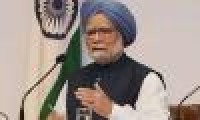Carping about Mr PM

You don’t say!
Darius Nakhoonwala
If you had been prime minister for ten years, what would you be most worried about in your last few months in office, your haemorrhoids or your legacy? Obviously, the latter.
But the obvious is the last thing to cross the minds of editors and their lackeys, the edit writers. So everyone expressed surprise that in his press conference last Friday, Manmohan Singh should have dwelt on that aspect of his two terms.
Everyone carped, which is their right, of course. And everyone failed to pick up on the key message that he was trying to convey, namely, that he was not free to act as needed. His finger pointed directly at Sonia Gandhi who had appointed him. Not a single editor had the courage to dwell on that.
Instead, they all carped like frogs in the monsoon about what an uncommunicative fellow the PM was. But tell me, if you were PM would you talk to a press that is as moronic as ours?
The Indian Express, as always first off the mark, pointed out that just like economic reform which is not an event, but a process “political communication should also be a process, not a rare event. The PM's press conference was only the third in 10 years.” Then it berated him for 353 words or about 85 per cent of the edit. So what’s new, McGupt?
The Hindu got it right when it said the press conference “was directed at his place in history as much as the looming general elections.” Then it wrote 125 words out of 500 on Rahul Gandhi. The whole edit read like a news report. Comment was restricted to the following 87 words. “However, glaringly evident was the Prime Minister’s refusal to acknowledge the UPA’s singular moral culpability for the mega-scandals involving spectrum allocation and coal block allotments. He went on to make the indefensible argument that being elected a second time absolved the UPA from its responsibility to face the corruption charges. Dr. Singh’s complacent recounting of the UPA’s achievements wore thin in the face of the clear dodging of accountability in this regard. The political costs of the UPA’s continuing state of denial are bound to be high.”
The Pioneer started with a jibe. “If there is any positive takeaway from Prime Minister Manmohan Singh's Press conference, it is that he will not be the Prime Minister if the UPA returns to power after the 2014 general election…he believes, laughably, that history will judge him more kindly than both the media and the Opposition have. He can have his illusions, but the fact is that, let alone the country, even his own party does not want him at the helm any longer than is absolutely necessary.”
Oh dear, such gratuitous nastiness in an edit. Sad, really, because the rest of the 450 words were in the same strain of cheap cracks.
The Times of India which has gone back to writing nice edits also focussed on Rahul Gandhi but made the entirely sensible point in its opening paragraph. “This should not mean, however, that government becomes a lame duck over the coming months… India's economy is at a vulnerable crossroads. The next elections may not yield a decisive result. It would, therefore, be in awfully bad faith to abandon rudder at this point. Moreover, the PM has little to lose now and he should feel fewer constraints on acting the way he chooses to.”
Spot on.
The Hindustan Times had a go at Manmohan Singh as well which is surprising given its Congress preferences. “Manmohan Singh is no more the feted leader he was but is seen as a captain of a ship who failed to read the headwinds correctly…the press meet was a typical Manmohan Singh press conference; he stuck to his usual ‘I tried my best, but things did not fall in place’ refrain. The prime minister’s retirement announcement is timely and it is good that it came from the man himself ahead of the All India Congress Committee meeting on January 17.”
The Telegraph forgot to write an edit.






